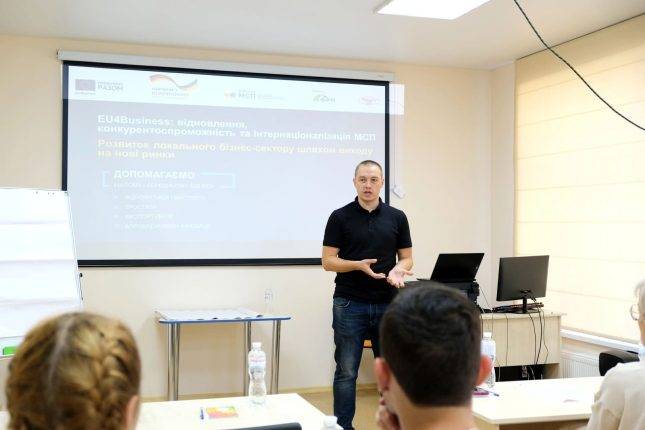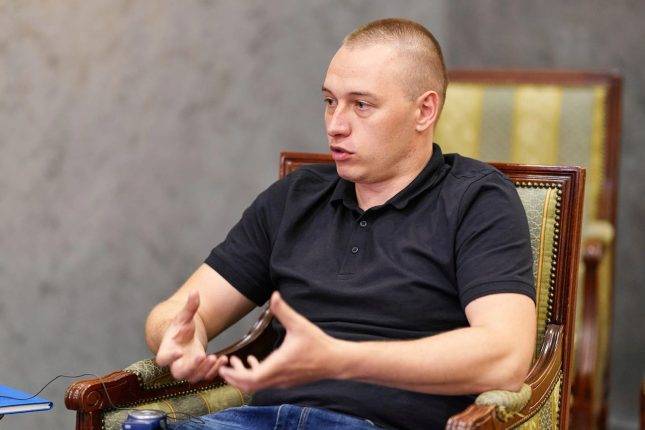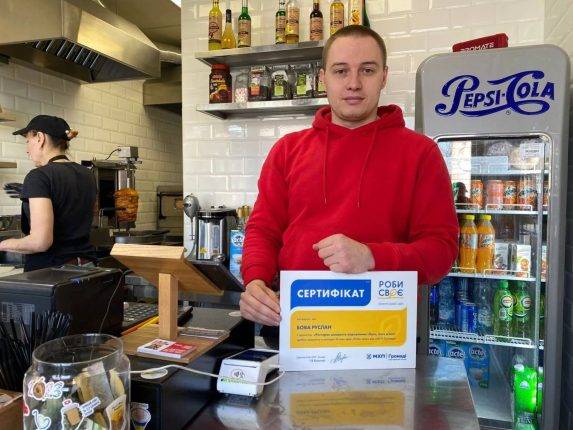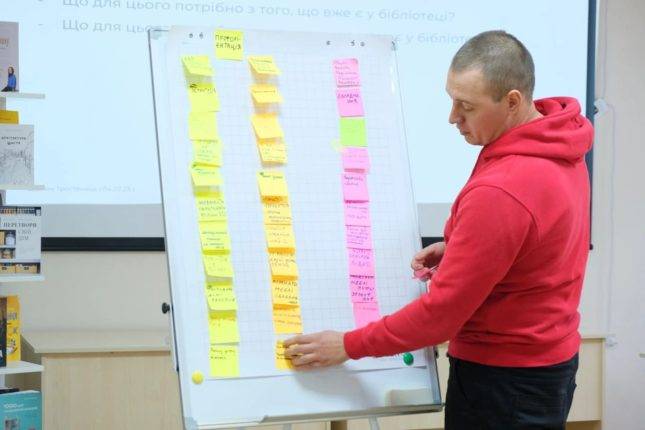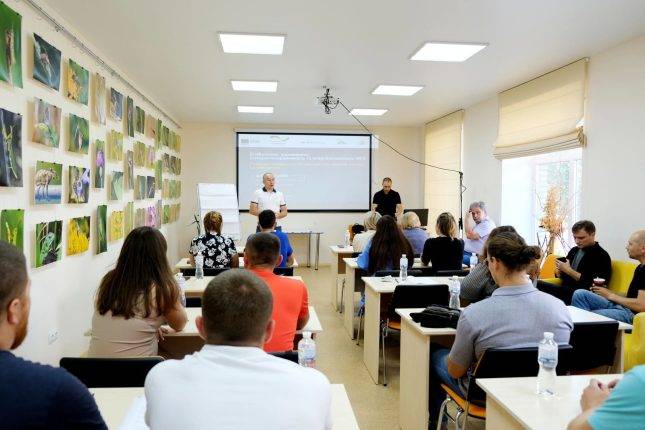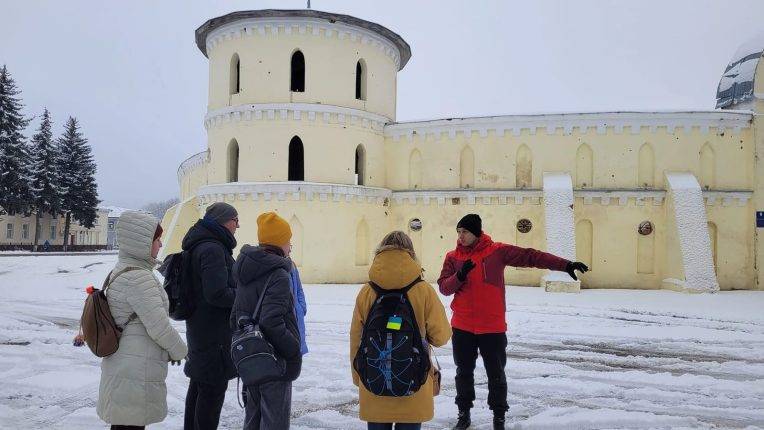
Rising from ashes: Trostianets in Sumy Oblast fights for recovery after occupation
21/11/2023
The small town of Trostianets in Sumy region was one of the first in Ukraine to find out what being “liberated” by Russia actually entails.
In just one month under occupation by Russian invasion forces, the town was “liberated” of practically every one of its laptop and desktop computers, and the warehouses of its businesses were looted of their goods.
For some of Trostianets’ residents, the Russian occupation cost them their lives, and part of the town was reduced to rubble.
But after being defeated at the gates of Kyiv, the Russians in late March and early April retreated from Kyiv, Chernihiv and Sumy oblasts.
Trostianets spent 31 days under Russian military occupation, from the afternoon of 24 February 2022 – just hours after Russian tanks started rolling across the Russian border, only 35 kilometres away – until 26 March 2022, when the town was liberated by a joint force of Ukraine’s 93rd Brigade and local resistance fighters.
While under occupation by the Russians, Trostianets had been ravaged, says Ruslan Bova, the head and initiator of an NGO called Centre of European Integration of the Slobozhanshchyna (Slobozhanshchyna refers to a historical region including north-eastern Ukraine.)
“According to estimates by the ReBuild Ukraine Initiative, the community lost $121 million in direct damage to infrastructure,” Bova says.
“That evaluation, however, fails to reflect the full extent of woes brought upon the Trostianets community and the town of Trostianets by the Russians. Ninety percent of municipal equipment was looted or destroyed. It seems that not a single desktop PC, not one laptop was left in the entire community. The stores and warehouses were stripped of goods, the businesses were robbed of their equipment – not to mention the fatalities (among residents).”
After Sumy Oblast was liberated in the spring of 2022, Bova’s NGO was forced to temporarily abandon its main area of work and switch full-time to helping the local community in Trostianets recover from the Russian occupation.
There was much to do, and a lot of resources were needed. But with by the joint efforts of donors, volunteers, community members and businesses, the town was brought back to life rather quickly. As early as the autumn of 2022, Ruslan Bova’s NGO was able to return to its main mission of developing the region.
One of the NGO’s key areas of work became the Trostianets Businesses Support Centre (or “Trostianteskyi Tsentr Pidtrymky Biznesu” in Ukrainian).
“Not a single industrial facility, store or café was left unaffected by the military occupation,” Bova recalls.
“Some businesses lost literally everything, from their buildings to their assets, others were more lucky to only lose their goods and commercial equipment. However, not one business owner came through the occupation without suffering significant losses.”
From business counselling to a Business Hub
The town lacked the resources even rebuild critical infrastructure, far less provide financial assistance to businesses. But it was perfectly clear to everyone that if business could not be revived, the proper recovery of the community as a whole would be impossible. The citizens who survived the occupation, along with those who left, to later return, and IDPs – who mostly came from Donetsk and Luhansk oblasts – needed jobs, social infrastructure, stores, car repair shops, and more.
Trostianets Businesses Support Centre, initially “housed” in a local library, took on the important role of first assisting businesses become operational again, and later of promoting entrepreneurship among the town’s residents – most of whom had never owned a business before.
“Initially, we mostly provided counselling in new tax legislation and accounting,” says Bova.
“Still, about 80% of requests were related to filing the necessary paperwork to apply for grants from our international donors and business-oriented initiatives, like the UNDP (United Nations Development Programme) Programme supported by EU4Business.”
After a while, the centre also managed launch training programmes for entrepreneurs, along with frequent workshops by business trainers and famous experts in the field. Participation in all of the initiatives organized by the Trostianets Businesses Support Centre is free.
All the while, the centre’s team was looking for a space that could accommodate all their projects, as the room and hours kindly provided by the library simply weren’t sufficient for the job at hand. The local government helped them find a space, donors covered the cost of its renovation, and the purchase of the necessary equipment was funded by Mayors for Economic Growth (M4EG) – a joint European Union and UNDP initiative.
It was as part of that initiative that the centre recently launched a project to support small and medium-sized businesses, called “Increasing the Involvement of the Citizens of Trostianets in Business Activities Through Creating a Business Training and Counselling Centre.”
One of the key objectives in launching the centre is to create and equip a space where business owners can get advice on applying for grants to kick-start their operations. The centre also gives advice on SMM and internet marketing, developing social media strategies, tax optimisation, and more.
What makes the M4EG initiative particularly special is that the municipality was provided with a special training course through the town being included in the Urban Imaginaries Programme. This programme promotes innovative approaches, like social participation, when tacking critical issues. This type of urban research is an effective tool for helping cities introduce measures that perfectly fit their local context, so they do not have to depend only on external best practices.
Before the end of the year, the Trostianets Businesses Support Centre will be operating at full capacity. Besides being provided with business counselling, local entrepreneurs will gain a modern business hub with a classroom, a study space, and a free co-working space. Newly minted entrepreneurs may even be provided with small business spaces when it is deemed necessary.
“This is the bare minimum of services that we want to be providing from day one,” says Bova.
“In general, we want to think big and excel. We’re planning on launching regular skill exchange trips to Europe, combining business networking with the pooling experience. Ideally, I’d like to launch the centre’s own grant programme, to make seed funding as accessible as possible to new entrepreneurs.”
Heavy Investment
With Trostianets just 35 kilometres from the border with Russia’s Belgorod Oblast, Bova believes that the town can’t expect that any investor will opt to build a multimillion-dollar factory, bringing several hundred jobs to the town.
“So we’re going to have to be self-reliant, and encourage people to start small businesses that they can later grow into something bigger,” Bova says.
“A lot of people want to try, but they lack knowledge and experience (in business).”
Meanwhile, the Trostianets Businesses Support Centre has already helped dozens of local entrepreneurs obtain grants, such as ones for rebuilding a ruined bakery and a destroyed store.
Recently, Trostianetski Kovbasy, a meat-processing enterprise, managed to obtain funding to rebuild its old production facilities and increase output. The enterprise’s business model relies exclusively buying livestock from local residents, which in turn provides a livelihood to not only several dozen of their employees, but numerous other residents in the countryside around.
Bova is upbeat about the town’s future prospects, and says he’s certain support comes to those who work hard. He says that he believes that despite all the hardships, destruction and pain, the Trosianets community will thrive and once again become the poster child of Ukraine’s decentralisation reform – as long as they keep working hard, and thinking big.
Mayors for Economic Growth is an EU-funded initiative launched by the EU in 2017. Since 2021, M4EG has been funded by the EU as part of the EU4Business Initiative, and implemented by the UNDP in close cooperation with the EU, local governments, and stakeholders.
Stories
-
Katarina Mathernova: If Ukraine had a human face and a human spirit, it would be 10-year-old Roman Oleksiv
-
A regional mission to drive social entrepreneurship: the story of Ksenia Kosukha
-
EU restores safe water supply for 100,000 Ukrainians affected by war
-
Promoting IT during the war: Lviv IT cluster and how EU4Digital helps
-
Frontline digitalisation: Kharkiv IT Cluster collaborations
-
How EU4Youth is driving opportunity and success among young Ukrainians
